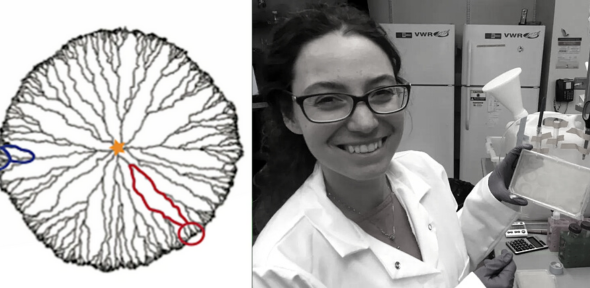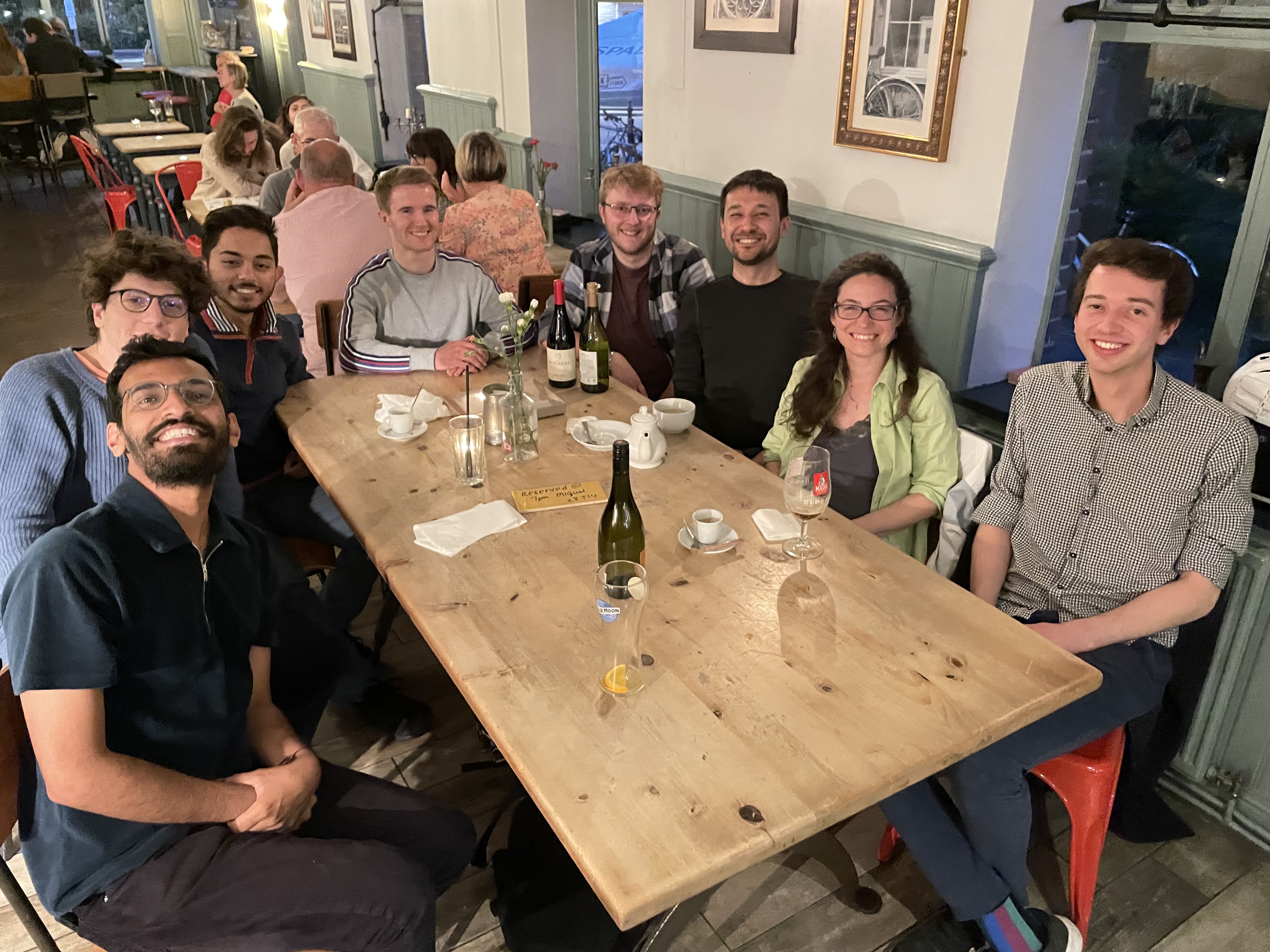
This blog is part of an interview series by Tara Murphy.
|
Tara Murphy I’m Tara, a NanoDTC student here at the Cavendish Laboratory in the University of Cambridge. Since arriving here last year, I’ve come to realise the exceptional work being carried out by the brilliant women at the Cavendish Laboratory and I think it’s crucial to bring attention to the remarkable achievements and invaluable contributions of these women, both past and present. Join me, as I sit down with the remarkable women of Cavendish Laboratory, delving into their personal journeys, research interests, and experiences in the scientific community. This week I spoke with Associate Professor Diana Fusco whose research focuses on computational biology. Here, she shared with us her journey through physics, the challenges she faced and how she found herself in Cambridge! |
Interview with Associate Professor Diana Fusco
|
To start off, can you tell me a bit about your background? I started with my undergraduate degree in Physics in Milan. It's hard to believe, but at the beginning, I wanted to become a particle physicist! Throughout my studies however, I realised I was more interested in statistical mechanics and thermodynamics. Because of my interests, I decided to do my master's thesis with my statistical mechanics professor, who was also interested in biological problems, particularly in applying statistical physics to biological questions. One problem we were interested in was how gene networks in the cell are wired. Typically, genes don't act in isolation but interact quite a lot, and that's a way to create the combinatorial complexity that is life! Some of these gene networks are well reported and studied, and throughout my time working with him, we were looking for statistical properties of these networks to see whether there were any kind of universal laws in these networks. It's hard to believe but back then, I hated programming, and I hated biology! I was very much focused on statistical physics. |
|
So how did you end up in the research field of computational biology? After my master's, I wanted to do a PhD and stay focused on these biological questions, gene networks in particular. I applied for many PhDs and most were focused on computational biology, which itself is a very broad field. Once I started searching for a PhD and interacting with other people, I found out that there were so many subsets of this field that I found interesting. One area that caught my interest was evolution. Particularly, how systems evolve and what are the laws that tend to make certain biological systems evolve in certain ways. So, I started my PhD working on this. Unfortunately, things didn't go as planned and in the middle of my PhD, I had to switch my project completely. I went back to more standard physics, soft matter and statistical physics, but still with applications in biology, for example I was looking into how proteins assemble and crystallize. |
|
How did you find your PhD, did you enjoy it? It must have been stressful suddenly having to change topic? I enjoyed my PhD, but towards the end, I got very frustrated because I was doing mostly theory and computation, which provided theoretical predictions, but could not find an experimentalist to validate them! I decided, if I do a postdoc, I want to learn how to do experiments myself. And you can imagine the difficulties in trying to convince a lab to hire a theoretician to actually do an experiment, especially as a postdoc! But I did find one in Berkeley which just happened to be willing to give me a shot. And by a strange coincidence the focus was, again, on evolution. |
|
You found yourself hopping back to evolution! Yes, I was hopping back and forth, but now I was focusing on microbial evolution, as opposed to the beginning of my PhD, which was more along the lines of organismal evolution. One thing I find exciting about microbial evolution is that you can actually run an experiment where you see evolution happen, because bacteria replicate so fast. Working in this field, I could have a model that predicts something and actually go and test experimentally whether my theory is correct or not, which I think is amazing! From a physics perspective, it was very exciting as I could validate my theoretical model and test it. |
|
I'm in a similar position now, after studying theoretical physics and completing an experimental master's degree. I always get very self-conscious thinking I'm going to break something in the lab. Did you have similar thoughts? Yes, definitely! At the beginning, I was very scared. My postdoc supervisor sent me to a summer school to actually learn to do some basic things. And initially, it was very, very scary. But I realised that this feeling is normal, and everybody goes through it and that pressure kind of goes away. But initially, definitely! |
|
And how did you find yourself to be in Cambridge? Good question! After two years into my postdoc, I started looking for faculty positions and well, I applied to a bunch of them. I saw this one in Cambridge being advertised and I applied without expecting to get it at all. And now I'm here! |
|
That sounds like an amazing journey, from Milan to the US and now here in Cambridge. Could you tell me a bit about your work here in Cambridge and what you're focusing on at the moment? Of course! My group mostly works on two areas. One is biofilms, which are bacterial communities. That's one area we study. However, I'll talk more about the second area we are interested in, bacteriophages. These are viruses that infect bacteria. I came across phages when I was in my postdoc, when chatting to a visiting postdoc from another research group. And I gotreally interested! The reason why I got so excited was that these phages are so incredibly simple and yet the most effective killing machine. Many people wouldn't even consider them alive! They are really like a passive object, but then once they enter a bacterial cell, they begin to replicate and, in few hours, decimate billions of bacteria. The visiting postdoc and I did an experiment in which we were trying to better understand the results of a previous paper, which looked at how bacteria evolve if you let them expand in space for a really, really long time. The authors of the paper found a certain result, but we thought that this was actually a by-product of how they were doing the sampling in their experiment. So we wanted to run the experiment they did but, for practical reasons, in less time. They ran it for a month and we wanted to achieve the same in two weeks. Diana Fusco's research Group |
|
And how did you make the experiment faster? In evolution, if you want to speed up time, you need something that replicates faster. And what is faster than bacteria? Well, viruses. So that's how we started this experiment. With viruses! We did exactly what the research group did in the paper, but checking different sampling mechanisms to see whether we would get different results. And the result we got was completely astonishing. What we were expecting and what they saw also in the bacterial case, was that as you let the population grow and expand, they start growing slower and slower. This result is very well known in theory and the authors of the paper had shown that. We were expecting the same for the viruses but with different degrees depending on how we were sampling. Instead, what we found was the opposite result. The phage was getting faster and faster and faster, and, after two weeks, it was spreading so fast that it was simply running out of space on the plate. |
|
Well, that's an exciting result. Are you still working on this? Yes! We're still trying to actually explain what happened in this experiment. One question we had was, why is the theory wrong? The decrease we expected is a well-known theoretical phenomenon and should happen, but it doesn't. So where was the theory wrong? And that started a really interesting project focusing on the coupling dynamics between bacteria and viruses, where the viruses, when propagating, also kill the bacteria, which affects their own diffusion and behaviour. You actually enter a different mathematical regime, with populations expansions that actually follow different evolutionary rules! All of this we hadn't realised before this experiment which was incredibly exciting. But there was another thing that came out of this experiment which was even more frustrating and which we're now pursuing. Let's say we now have a theory as to why expansion gets faster, rather than slower. To test this, we could go and measure certain parameters of how the phage and bacteria interact. Specifically, our theory gave us a very specific prediction for how a phage should evolve throughout time and be able to change the evolutionary trajectory in order to spread faster. However, when we went and measured these parameters and compared our evolved phages with their ancestors, they looked the same, ! even if the evolved ones spread almost five times faster than the ancestor. So clearly there was something fundamentally wrong with our understanding of how phage populations expand, or with our measurements, or with both! One issue we think it’s key is that both model and measurements are based on population average values. But the reality is that anything in life is very stochastic. And sometimes, the same average behaviour can have different outcomes, because the outliers in the distribution have dominating effects. |
|
Oh, that sounds incredibly complicated. Because of this we had to develop a new theory, on one side, and come up with new experimental protocols. In a way, we had to really go back to scratch and reinvent both theory and experiments. But we're now beginning to understand and model these phages extremely well and develop a theory that aligns with our experimental observations. |
That’s sounds so exciting Diana! Thank you so much for sharing your research with us and I can’t wait to see the results of your upcoming publications.
To know more about Diana Fusco's research visit - https://dianafusco.wixsite.com/fuscolab
Read other blogs from Tara - https://murphytarra.wixsite.com/tara-murphy-website/blog
Banner Image: Diana Fusco
Image Credits: Diana Fusco & Tara Murphy


